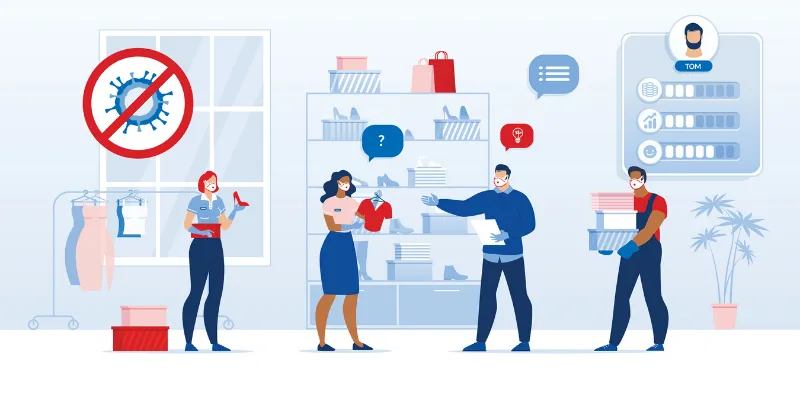The future of fashion and retail industry in the post-COVID-19 era
While the world seems to be adjusting to a ‘new normal,’ the fashion and retail industry is expecting the demand to surge, and hoping to bounce back to the pre-COVID-19 state.

The much-awaited unlock has finally happened, and after more than two months, the retailers are beginning to evaluate the losses they have incurred as a result of the lockdown ensued by the coronavirus pandemic.
The COVID-19 outbreak is still running wild and rampaging around the world, and even by the most generous estimates, we're still six to eight months away from a vaccine.
However, amid all this chaos, the unlock has begun. People have started coming out of their homes, albeit wearing masks and carrying pocket sanitisers. The world seems to be adjusting to a ‘new normal,’ and learning to live with the virus.
Naturally, the fashion and retail industry is expecting the demand to surge, and hoping to bounce back to the pre-COVID-19 state. Many retailers are even expecting the demand to be higher than the pre-COVID-19 era, as buyers, who had been cooped up in their homes, would now be able to shop.
But perhaps we ought to refrain from being over-optimistic. For example, in Germany, the government decided to open up departmental stores, malls, and car dealerships, among others. But, people chose to stay indoors, saving their money for possible future emergencies.
Thus, it is difficult to predict consumer behaviour at this point. Keeping these things in mind, here’s what the fashion and retail industry should expect in the post-COVID-19 era.
Social distancing to become the norm
Even though many governments are allowing retail stores to open, they're doing so while imposing a strict set of guidelines and conditions to prevent the further spread of COVID-19.
If the stores want to do business, they have no choice but to comply with these guidelines. The problem for the stores in imposing social distancing norms is that it limits the number of customers that can be present inside the premises, leading to fewer sales.
Some fashion retailers might also adopt the appointment system, where the customers would make an appointment for shopping, show up at the designated time, and browse for a certain time window that is allotted to them.
However, this strategy would only work for brands that cater to the premium segment, and can generate higher profits on lower sales volumes.
For the majority of retailers, maintaining social distancing is seriously going to affect business, and may eventually lead to downsizing or closing of certain stores.
Managing the fear of infection would be key to making sales
We have a serious health emergency on our hands, unlike anything we've seen in the past. As such, it is only natural that people have become extra-careful and extra-cautious in terms of avoiding the infection.
Wearing masks, avoiding handshakes, and sanitising the hands have now become a habit. Naturally, shoppers would prefer to go to establishments that have strict hygiene measures in place.
A survey conducted in the US showed that 87 percent of fashion buyers preferred shopping at places that offered contactless, cashless shopping, and self-checkout options. The idea of a "cashless transaction system" has existed in India for a while now, and this pandemic could accelerate its adoption.
Omnichannel approach will be the new trend
When the pickings are slim, you've got to cover every base you can to make up for the loss. The omnichannel approach, which has been a rising trend for a while, picked up the pace ever since the lockdown was imposed. The pandemic has caused a boom in the ecommerce industry.
People are preferring to shop online, instead of bobbing and weaving through the crowds in bustling stores and putting themselves at risk. This is an opportunity that many retailers are encashing upon, and this approach will only gain ground in the future.
The fear of contracting infection will make people reluctant to try on clothes that other people have tried on. To counter this issue, some technological aids may come to the rescue.
What would the retail staff have to cope up with?
There is going to be a paradigm shift in the working conditions for the retail staff, at least for the foreseeable future. Many companies, instead of laying off their employees, have opted to repurpose them.
For example, many store assistants are now assisting customers with virtual shopping, or are being made to perform ecommerce duties. We might see more of this trend in the future as a lot of medium and small-scale retailers are migrating to the ecommerce platform.
There is also going to be a change in the timings for the workers. Many stores have already opted for staggered shifts, and many more could do so in the near future. Reducing the number of people present inside the store premises at a time is important — whether those people are staff or customers.
Planning is the key to success
The pandemic has thrown our entire lives out of order, and we've been forced to create a new normal. And this is where innovation comes in. With technology, things would likely become easier moving forward.
We will eventually transition out of this pandemic, but it's going to be a gruelling process, and patience and perseverance would be the key determinants of success.
Edited by Suman Singh
(Disclaimer: The views and opinions expressed in this article are those of the author and do not necessarily reflect the views of YourStory.)









